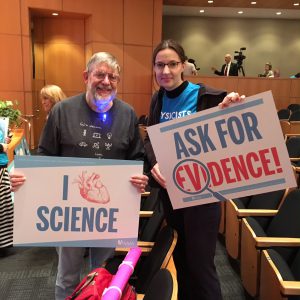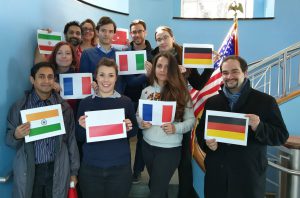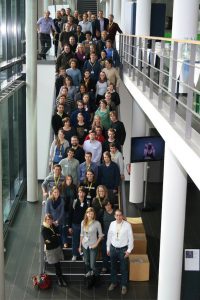Since beginning my Ph.D. studies in 2010, I have come to appreciate the significance of advocating for science to the public and other stakeholders, as well as advocating for the needs of fellow scientists. As such, this page offers a curated selection of the activities in which I have been or continue to be involved:
Elife Ambassador
 In 2017 eLife announced the launch of its first Elife ambassador program with the aim to support eLife’s efforts to improve the way science is performed and communicated. I applied to the program and became one of 150 ambassadors from six continents in 2018. Working with eLife, we supported the development and scope of initiatives ranging from encouraging the use of preprints to increasing the reproducibility of science by leading conversations in our local communities and facilitating local discussions. During my time as an eLife ambassador, I was invited to multiple events with scientific stakeholders as a representative of early career researchers in Washington D.C. (e.g., ASAPbio’s “Transparency, Recognition, and Innovation in Peer Review in the Life Sciences (February 2018)” meeting with Jeremy Berg (Science), Philip Campbell (Nature), Randy Schekman and others), supported the realization of webinars on eLife’s platform and launched the blog “We support preprints…” with supportive statements by scientists and other stakeholders about preprints. After the end of the first cohort, I have also successfully applied to become a participant of the second cohort of eLife’s community ambassador program and could continue my efforts until the end of the program this summer. Interacting with so many engaged scientists and stakeholders from all over the world has given me the confidence and courage that we (each and every one of us) can change how science is done for the better.
In 2017 eLife announced the launch of its first Elife ambassador program with the aim to support eLife’s efforts to improve the way science is performed and communicated. I applied to the program and became one of 150 ambassadors from six continents in 2018. Working with eLife, we supported the development and scope of initiatives ranging from encouraging the use of preprints to increasing the reproducibility of science by leading conversations in our local communities and facilitating local discussions. During my time as an eLife ambassador, I was invited to multiple events with scientific stakeholders as a representative of early career researchers in Washington D.C. (e.g., ASAPbio’s “Transparency, Recognition, and Innovation in Peer Review in the Life Sciences (February 2018)” meeting with Jeremy Berg (Science), Philip Campbell (Nature), Randy Schekman and others), supported the realization of webinars on eLife’s platform and launched the blog “We support preprints…” with supportive statements by scientists and other stakeholders about preprints. After the end of the first cohort, I have also successfully applied to become a participant of the second cohort of eLife’s community ambassador program and could continue my efforts until the end of the program this summer. Interacting with so many engaged scientists and stakeholders from all over the world has given me the confidence and courage that we (each and every one of us) can change how science is done for the better.
ASAPbio
My eLife Ambassador engagement (in particular my preprint activities) has motivated me to become an ASAPbio Ambassador in 2018. ASAPbio (Accelerating Science and Publication in biology) is a scientist-driven nonprofit working to address this problem by promoting innovation and transparency in life sciences communication. One of my main activities within ASAPbio is the cross-sharing of preprint stories.
NIH Visiting Fellows Committee (VFC)
 During my postdoc stay at the National Institutes of Health | National Cancer Institute in Bethesda, I was co-chairing the NIH Visiting Fellows Committee (VFC), a self-governing body serving the interest of all visiting fellows at the NIH. Together with all committee members, we organized career seminars, workshops, symposia, hikes, culture events, sports outings, Halloween parties, Happy Hours, Brown Bag seminars, and many more events. But we also raised our voice during the monthly FelCom meetings to highlight obstacles faced by visiting fellows accompanied with suggestions for possible solutions.
During my postdoc stay at the National Institutes of Health | National Cancer Institute in Bethesda, I was co-chairing the NIH Visiting Fellows Committee (VFC), a self-governing body serving the interest of all visiting fellows at the NIH. Together with all committee members, we organized career seminars, workshops, symposia, hikes, culture events, sports outings, Halloween parties, Happy Hours, Brown Bag seminars, and many more events. But we also raised our voice during the monthly FelCom meetings to highlight obstacles faced by visiting fellows accompanied with suggestions for possible solutions.
Lindau Blog
Since 2016, I am writing for the Lindau Blog about women in science and science advocacy/policy. The blog is an online blog by the Foundation Lindau Nobel Laureate Meetings in Lindau. Amongst other articles (e.g., more than 30 blog post about women in science), I wrote the following two blog posts about the March for Science in 2017 and preprints in 2018:
- “When Science Is Under Attack…” (24/04/2017) with Broder Schmidt
- “In Transition: Scientific Publishing in the Life Sciences” (18/04/2018) with Randy Schekman and Martin Chalfie
Max Planck PhDnet
 At the end of 2010, I participated in the annual meeting of the Max Planck PhDnet, the network of all Ph.D. students of the Max Planck Society (MPS), as the official Ph.D. representative of my Max Planck Institute, the Max Planck Institute for Biophysical Chemistry (MPIbpc). At the meeting, I was elected to be the deputy spokesperson of the Max Planck PhDnet and representative of the Ph.D. students of the CPT section of the MPS for 2011 (Offspring magazine; page: 3). During my period of office, we met several times with MPS stakeholders at the headquarters in Munich and were able to release the Best Practice Guide, a guidelines document for directors, supervisors, and Ph.D. students of the Max Planck Society. Important issues, such as supervision, time planning, and parental support, are key questions addressed therein, and the MPS strongly endorses the fast implementation of these approved guidelines within the daily institutes’ business. Furthermore, we laid the groundwork for a fundamental administrative change: the change of the employment status of Ph.D. students within the MPS. A few months after my term, with the additional effort of successive PhDnet steering groups and external initiatives launched by Ph.D. students, the MPS finally decided to treat all of its Ph.D. students as employees, giving them equal professional status and full social security benefits and employment protections. I have never felt so proud and empowered at the same time.
At the end of 2010, I participated in the annual meeting of the Max Planck PhDnet, the network of all Ph.D. students of the Max Planck Society (MPS), as the official Ph.D. representative of my Max Planck Institute, the Max Planck Institute for Biophysical Chemistry (MPIbpc). At the meeting, I was elected to be the deputy spokesperson of the Max Planck PhDnet and representative of the Ph.D. students of the CPT section of the MPS for 2011 (Offspring magazine; page: 3). During my period of office, we met several times with MPS stakeholders at the headquarters in Munich and were able to release the Best Practice Guide, a guidelines document for directors, supervisors, and Ph.D. students of the Max Planck Society. Important issues, such as supervision, time planning, and parental support, are key questions addressed therein, and the MPS strongly endorses the fast implementation of these approved guidelines within the daily institutes’ business. Furthermore, we laid the groundwork for a fundamental administrative change: the change of the employment status of Ph.D. students within the MPS. A few months after my term, with the additional effort of successive PhDnet steering groups and external initiatives launched by Ph.D. students, the MPS finally decided to treat all of its Ph.D. students as employees, giving them equal professional status and full social security benefits and employment protections. I have never felt so proud and empowered at the same time.
PhD / Postdoc Community
At the beginning of my Ph.D. studies in 2010, I joined the Ph.D. / Postdoc Community at the Max Planck Institute for Biophysical Chemistry (MPIbpc) in Goettingen. After six months, I joined the annual meeting of the Max Planck PhDnet (previous section) as the official Ph.D. representative of my institution after I was elected to the chair of the Ph.D. / Postdoc Community. During more than three years as Ph.D. / Postdoc Community chair, we have organized multiple sports events, get-togethers, career events, soft skill courses, retreats, photo competitions, scientific symposia, and many more events. Furthermore, we mediated conflicts between PIs and Ph.D. students and discussed with the board of directors of the MPIbpc strategies to improve the Ph.D. education at our institute.
For further information or if you have any questions, please do not hesitate to contact me.